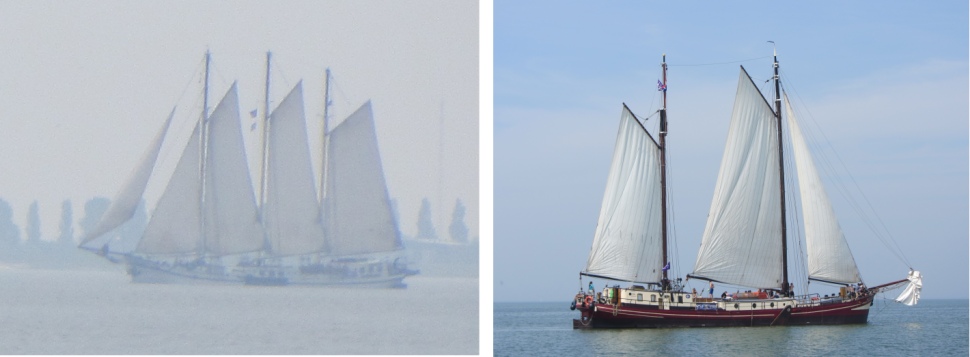 Tall Ships Heading for Makkum |
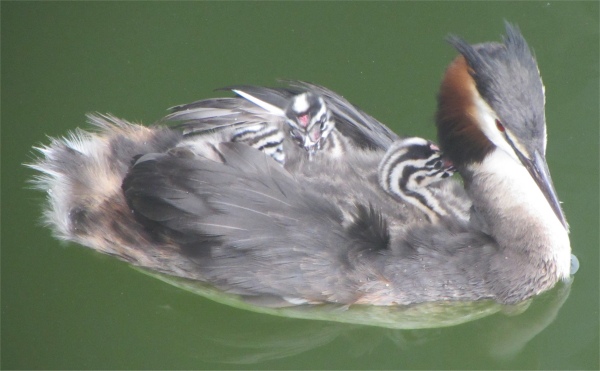 Grebe with Two Chicks on her Back |
We were also planning to visit Den Helder towards the back of the week for the Tall Ships event. However, we had concerns over whether the marinas along the west coast of the Ijsselmeer would be packed out during the occasion. We also needed a plan for an efficient way of using public transport from our base on that side of the mere to Den Helder.
I managed to track down the harbour master, who assured me that there would be plenty of room for us in our preferred destination of Enkhuizen. Regarding transport to Den Helder, he suggested bus or train from Enkhuizen to Alkmaar, and then bus from there to Den Helder. "Oh, we can get a train for that leg," I said. He gave me a puzzled look, and stated, "There are no trains from Alkmaar to Den Helder." I pointed out that Meryl had made the journey to Den Helder by train, and it had passed through Alkmaar. The chap shrugged his shoulders and told me he hadn't realised. That made me wonder as to the credibility of his other comments.
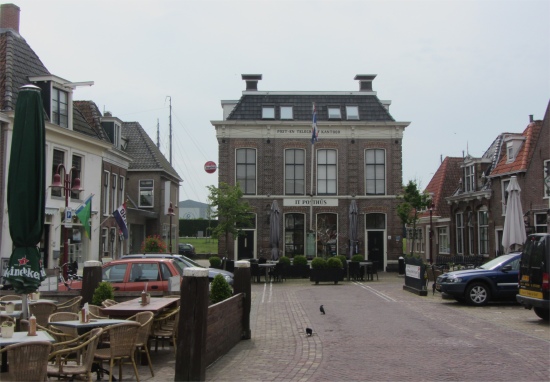 The Posthuis (Post Office) |
We motored out from the marina into the mere, hoisted our sails, and gently drifted northwards under light air. The speed and direction of the light wind was variable, and we occasionally had to put a tack in.
The sun shone favourably on us and gently warmed our bones. It felt good to be under sail again, albeit speeding along at turtle pace, but there was no hurry. I must learn to slow down and chill out. It was a fine day for flying insects, which took great delight in alighting on Duonita and her crew. It must have been mating season since the decks gradually became covered in dead insects, or perhaps I just smelt bad.
All around us was a multitude of small watercraft, many lazily sailing, some under engine power, all rather splendid. We could have been sailing in the Mediterranean.
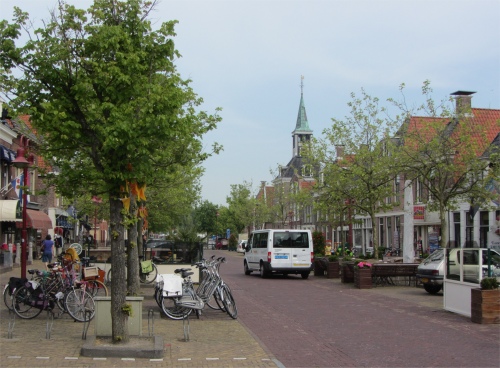 Markt |
We glided slowly along for hours, the idyll occasionally being broken by two air force jets engaged in exercises over the mere.
Sadly, time was pressing on, and we needed to do a food shop in Makkum, so once we were a couple of miles out of town, we took the sails down and motored into the broad channel that led up to the town of Makkum. Passing a large impersonal marina, we carried on up to the town quay where a host of tall ships were moored, and turned around to find a pleasant, small marina. The whole area seemed to be full of marinas.
We berthed along what appeared to be a visitors pontoon, and no sooner had we tied up, when a tall chap with close cropped hair bounded up, and introduced himself as Dick, the Dutch owner of the marina. He sold it well, and we had a home for the night, with excellent, clean facilities. The humorous guy was happy to let us moor where we had pulled up, and I gathered British yachts were as rare as hen's teeth in this neck of the woods.
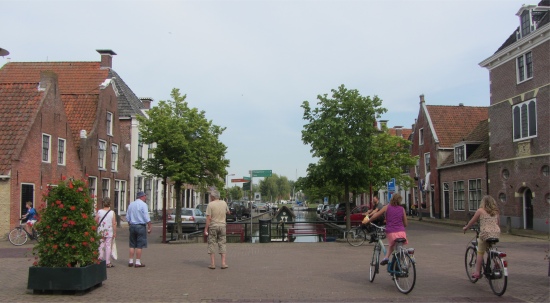 Turfmarkt |
We wasted no time in walking to town to buy provisions. Dick's 20 minutes walk was more like a good 30 minutes walk. Makkum was known as the gateway to the Zuiderzee for its locks which were owned by the neighbouring monastery. This strategic position meant Makkum could develop to an important centre of trade. The Golden Age of Makkum started in the 17th century and lasted until the 18th century. Makkum became an important centre of trade and industry, including brick works, wind-powered saw-, oil-, paper-, and pealing mills, ship yards and seashell lime kilns. The lime kiln industry was the major pillar of Makkum's prosperity employing many people. The high quality quicklime produced was amongst others used in house construction in Amsterdam. Transport of base materials and end products was by ship which caused shipping and ship construction to flourish. Seashell fishing was of importance next to common fisheries.
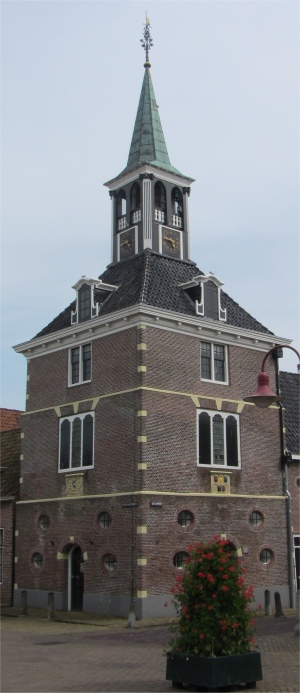 Waag |
On a Spanish map from 1572, today's location of Royal Tichelaar Makkum's ceramics factory was already marked "bricaria": a brickyard. It is the oldest proof of the company's more than four centuries of uninterrupted ceramic history. By 1670, domestic pottery had replaced bricks as core business and from 1890 Royal Tichelaar Makkum concentrated on ornamental earthenware.
The essential material, Frisian clay, is still dug up locally. Tichelaar still works with yellow baking clay. The special character of the Tichelaar Makkumer earthenware is produced by the self-made, mysterious tin-glaze which gives this pottery its gloss and brilliance. Unlike the Delft pottery where they switched to using white baking clay in the mid-18th century, Tichelaar has never deviated from this ancient technique. There is also one major difference between the pottery of "The Royal Delft" and the pottery of "Tichelaar". Because the painting is done on the glaze, the pictures "flow" somewhat into the glaze during the baking-process. In Delft they paint under the glaze layer, causing the pictures to be slightly more pronounced and sharper.
The pottery Royal Tichelaar Makkum is one of the oldest companies of the Netherlands. Having an interest in ceramics, I would have dearly loved to spend a day looking around the pottery, but sadly the factory had closed for the day by the time we arrived.
There was much evidence of Makkum's other remaining industry as we walked through an industrial area which hosted everything from small boat repair yards to a colossal, enclosed, ship building hanger.
The town was like many we'd seen in Friesland, very pretty and photogenic, with a network of canals running through it. In the Markt I enquired in a haberdashery as to where I could find a supermarket. An elderly chap, squinting to thread a needle, which he was not having much success at, rattled off a sequence of directions to me in Dutch, 80% of which I understood. Then his daughter reiterated it all to me in perfect English, much to his annoyance. I thanked the pair, and soon we were loaded up with bags of shopping.
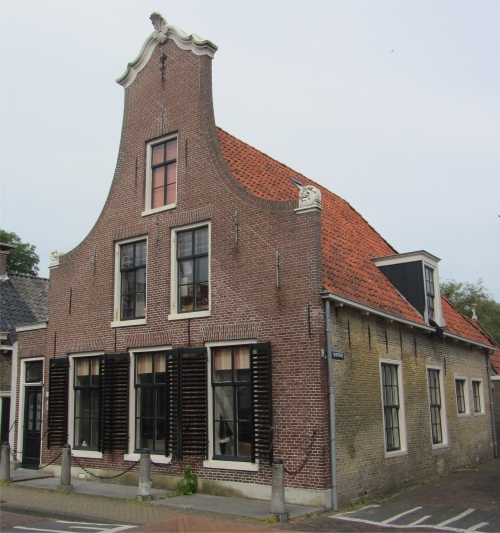 Typical Makkum House |
We stopped off at an outside restaurant, De Zwaan, in what could be described as the town square, though it was more of a crossroads actually. In my best Dutch I asked, "Mag ik drie kleine bieren?" The girl seemed to understand, muttering something to me, and went off. Five minutes later she returned with two small beers. She thought I'd said "twee" (two) instead of "drie" (three). The two do not sound the same. I'll get to grips with this language if it kills me.
While we sipped our beers, Rex decided to call his mother. Now Rex tended to switch his phone off when he wasn't using it; a bit pointless since how could people call him? "It is what it is" I guess. When he switched it on it boomed out a signature tune which he found totally embarrassing (no it wasn't Loony Tunes) for some reason. On this occasion he decided to place his phone in his armpit while the tune played out. A comical sight! God only knows what the surrounding customers must have thought of this spectacle.
Suitably refreshed, we returned to the marina via the town quay where a dozen or so tall ships were tied up. Further along the quay, over the creek by the gigantic ship building shed, an exceedingly large gin palace lay, with four decks visible above the waterline, and five large radomes. It was as tall as the tall ships.
When we reached the marina, hot and weary after our mammoth hike, a few dogs started bellowing above us. Then Dick, the marina owner popped his head over the balcony of the flat that we stood in front of. He had a couple of basset hounds and a dog that had collie ancestry somewhere along the line. He was tickled pink to have British customers, and invited us up for a drink. Meryl just wanted to have a shower after our hike, so Rex and I accepted Dick's kind offer. He came down some stairs and led us up to the balcony for drinks. Rex apologised for Meryl's absence. "My wife is hot," he explained. At this Dick fell about into a burst of fits of laughter. "His wife is hot," he giggled over and over again to another chap sitting on a settee on the balcony. When he eventually managed to compose himself, he introduced us to Robert, and poured us a light beer each.
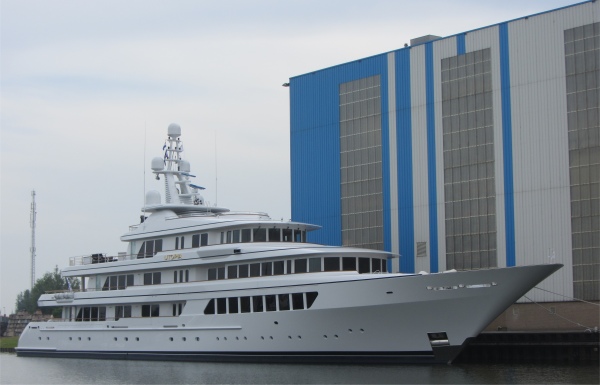 Russian Yacht with Ship Building Shed Behind |
Dick had been a yacht broker, and after selling 300 yachts, he had been running the marina for 19 years. We were his first experience of British customers. He rented out one of his boats. The bulk of his customers were Dutch and German. He preferred the latter, they were always clean, quiet, polite and punctual.
We described our adventure to Dick and Robert, who were astounded to learn that we were retired and our journey was lasting a month. The concept of people being cooped up together for that length of time intrigued him, and in particular a married couple sailing with a single guy. "Where is your wife?" Dick asked, rather persistently, such that I had to bluntly explain. Then it was, "Have you got a girlfriend?" to which I replied, "No." Persistently, the next salvo came in, "Why haven't you got a girlfriend?" Did I really want to discuss the pros and cons of a widower/girlfriend relationship and associated emotional conflicts, with a stranger? It was at this point that Dick introduced Robert as his husband. I didn't know where this conversation was going at this point. Was he hoping for a threesome? A convenient moment occurred when we took our leave. Despite their inquisition, Dick and Robert were a friendly and hospitable couple.
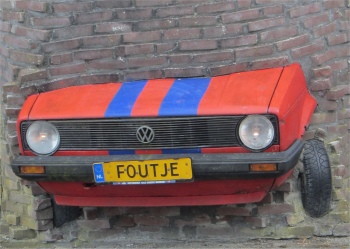 Foutje (Mistake) |
We walked over a lock surrounded by historic merchant houses, and had a brief look around the town, stopping to look at the Waag - most towns had a Waag.
We returned to the restaurant where we have enjoyed a beer each earlier in the evening. To avoid all confusion with pronunciation, Rex ordered drinks this time, and as usual he ordered impeccably and we all received exactly what was ordered.
The food was excellent, and our waitress could chat in English. We learned from her that the massive yacht we had seen earlier belonged to a Russian oil baron, it cost one million euros per metre to build, and was 98m in length. The vessel still had to be fitted out, which would add millions more to the price tag. To end our splendid meal, the last one we would be having in Friesland, I opted to have a Fryske Koffie (Friesland coffee), a sort of Irish coffee made using a Frisian whiskey - real firewater!
Sauntering back to Duonita, we passed by the huge Russian vessel again. "That can't be as long as 98m," I said. "Of course it is," said Rex. After a wee debate, Rex somehow cajoled me into sprinting the length of the boat, on shore of course, and he was going to time me. How on earth would that be a measure of anything; I don't run 100m in 10 seconds on a regular basis. But being the fool that I am, I took him up on it. After half the specified length, I felt a twinge from a groin muscle, and after 80% of the length I pulled up, not wishing to do serious injury to myself. I limped back to the boat after that foolhardy act of bravado. Served me right!
